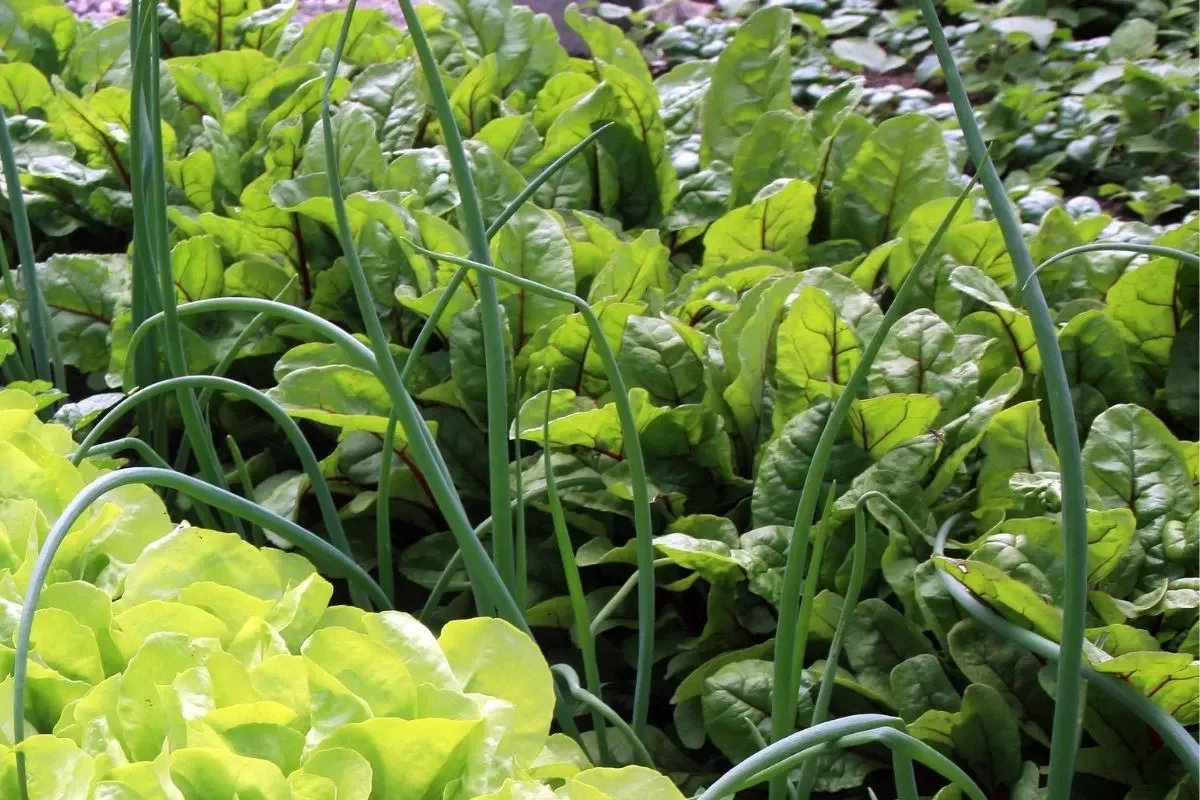Onion companion plants care is important in keeping your garden healthy and productive. Onion companion plants are vegetables, herbs, and flowers that can be planted together with onions to provide beneficial properties that help increase yields, repel pests, and improve soil quality.
Read on to learn more about how to care for your onion companion plants.
What are Companion Plants?
Companion plants are plants that grow near each other, usually for the benefit of both plants.
Companion plants can help protect others from pests and disease, provide shade, fix nitrogen, attract beneficial insects, and improve soil health.
In companion planting, you should select plants with the different sun, water, and nutrient needs, so they don’t compete.

Why Use Companion Plants with Onions?
One of the most important reasons to use companion plants with onions is that they act as a natural pest deterrent.
Certain plants have naturally occurred properties that can repel certain pests, and companion planting allows you to take advantage of these properties without having to resort to using chemical insecticides. Some of the best pest-deterrent companion plants for onions include chives, garlic, dill, and marigolds.
Using companion plants with your onions can encourage beneficial insects that will help pollinate the crop and keep destructive pests in check.
Beneficial insects such as ladybugs, lacewings, and syrphid flies feed on aphids and other damaging pests, which helps keep your onion crop safe from damage. Planting herbs such as parsley, oregano, sage, and thyme can attract beneficial insects to your garden.
What Are the Best Onion Companion Plants?
Onions are a popular vegetable in home gardens and can be a great companion for other plants. Companion planting is a natural method of pest control, improving the soil and the flavor of vegetables.
Some of the best companion plants for onions include:
Chives: This herb repels aphids, Japanese beetles, carrot rust flies and other pests. Chives also add flavor and nutrition to the soil when chopped up and added as mulch.
Garlic: An excellent choice for pest prevention, garlic repels aphids, spider mites, nematodes, and other pests. Garlic also provides sulfur, calcium and nitrogen to the soil.
Radishes: An excellent choice for pest control, radishes attract beneficial insects like lacewings and ladybugs while repelling pests like flea beetles and aphids.
Carrots: Carrots are also great for pest prevention and attract beneficial insects like ladybugs. Carrots also help to aerate the soil around your onion crop.
Parsley: Parsley attracts beneficial insects and provides calcium, nitrogen and phosphorus to the soil.
Tips For Caring Onions with Other Plants
- Provide adequate space between your onion and companion plants. While onions are not overly aggressive in their growth habits, they need room to spread their roots and get the nutrients they need. Please leave at least six inches of space between the onion and companion plants.
- Keep the soil moist. Onions are susceptible to moisture levels, so ensure the soil is moist to prevent them from drying out and dying. Water regularly during dry spells and mulch around the plants to help retain moisture.
- Weed regularly. Weeds can compete with your onion and its companion plants for light, water, and nutrients. Keep an eye on your garden and remove any weeds you find.
Frequently Asked Questions
How To Grow Onion Companion Plants?
Growing onion companion plants is a great way to help protect your onions from disease and pests and to ensure healthy growth. Here are some tips for successfully planting onion companions:
- Choose the right companion plants. Onion companions can be annual or perennial flowers, vegetables, herbs, or grasses. Make sure you choose varieties that grow well in your particular climate and soil type.
- Plant your onion companions near the onions. The companions should be planted 6-10 inches away from the onions to give them enough room to spread out without competing for resources.
- Plant the companions in well-draining soil. To ensure that your onion companion plants have all the nutrients they need, plant them in well-draining soil that has been amended with organic matter.
- Water the plants regularly. Companion plants should be watered periodically to ensure they remain healthy and thrive alongside the onions.
- Fertilize as needed. Depending on the types of companion plants that you choose, you may need to apply fertilizer occasionally to keep them healthy and thriving.
Conclusion
Growing onions with companion plants is a great way to ensure your vegetable garden remains healthy and productive. Companion plants can provide various benefits for onions, including pest control, nutrient balancing, and even better-tasting onions.
When choosing companion plants for your onions, be sure to select plants with similar growing requirements and ones that offer the specific benefits you’re looking for. You can enjoy a thriving garden with abundant onion harvest with proper care and attention.
